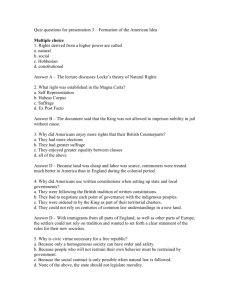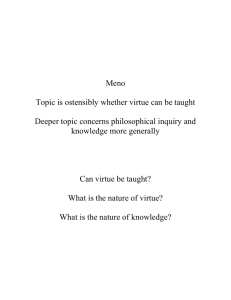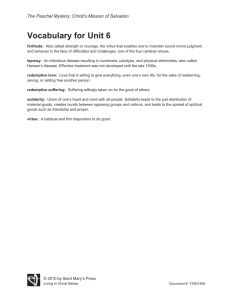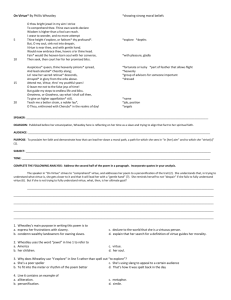Plato, Meno
advertisement
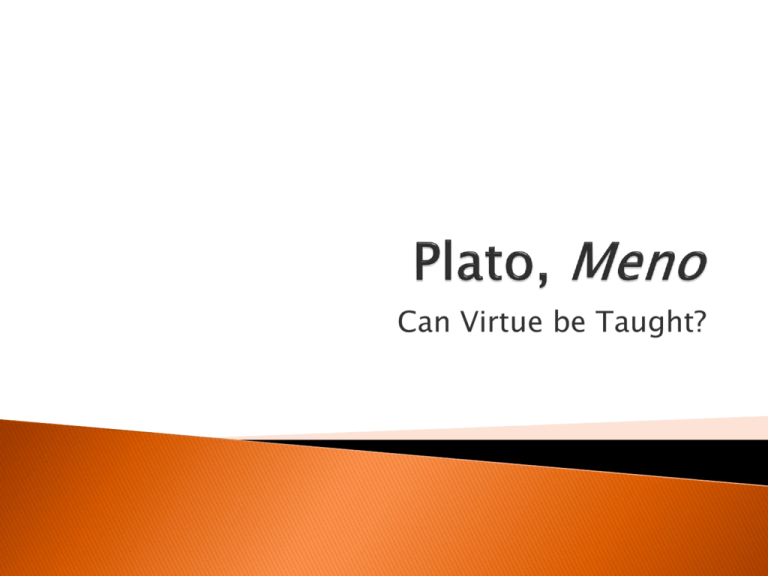
Can Virtue be Taught? ‘Old’ features: Looking for a definition – in this case, what virtue is and whether it can be taught – and, in the first part of the dialogue, not finding an answer. Philosophy as a process of Q&A, not rhetoric (speech making) or sophistry: examining your beliefs critically Caring for your soul – rather than money, political power, etc. – is the most important thing. Putting forward positive positions: The possibility of inquiry and the theory of recollection Anamnesis: the soul is eternal, knows ‘everything’ but has to recollect it Virtue as a form of wisdom The difference between true belief and knowledge The beginning of a theory of Forms Lack of women Almost no women in Plato’s dialogues Women had few rights in Athens (different in Sparta) No vote: not allowed to participate in political life Restricted to home Hints of male homosexuality Modern vs. Ancient Educational component Transitional Interfemoral or intercrural sex Aristocratic practice Section 1: Meno's opening question and the discussion about the meaning of virtue, a section which ends with Meno's complaint about Socrates merely leading him and others into confusion without providing a clear answer (up to 80b). Section 2: The discussion of knowledge as recollection and the experiment with Meno's slave, a section which ends with Socrates urging us to seek for the truth within our own souls (which carry all knowledge) (from 80b to 86c). Section 3: The enquiry into whether virtue is knowledge or comes by nature, whether there is any difference between true opinion and knowledge, a section which ends with the apparently skeptical conclusion that virtue comes neither by education nor by nature, so it must be a gift from the gods (from 86c to the conclusion of the dialogue). “Can you tell me, Socrates, can virtue be taught? Or is it not teachable but the result of practice, or is it neither of these, but men possess it by nature or by some other way?” (70a) Must know what x is before we can specify its characteristics. In this case, we must know what virtue is before we can know whether it can be taught Typical Socratic claim about ignorance There is a virtue for men (viz., being able to manage public affairs, benefit his friends, harm his enemies, & cause no harm to himself), another for women (viz., manage home well, preserve its possessions, & be submissive to her husband), and others for children, slaves, etc. (71e) Typical Socratic response: looking for overarching, essential characteristics for all types of virtue. (72b-73c) Bee analogy (72b-c) Meno: “I would say that they do not differ from one another in being bees.” Genus-species definition Universals Forms (eventually) Socrates: “The same is true in the case of the virtues. Even if they are many and various, all of them have one and the same form which makes them virtues…” (72c). Two key assumptions: first, that such a universal exists (if not in the real world around us, then in the intelligible world--if we cannot see it with our eyes, we can perceive it with our minds) and, second, that a proper answer to the question about virtue must focus on some way of reaching this intelligible universal. Socrates doesn't explicitly make either of those two claims, but they are clearly implied by the question and by Socrates' example of the definition of shape. Virtue is the ability to rule (73d) But: doesn’t apply to children or slaves (therefore, the definition too broad) But: perhaps it needs to specify that one rule justly (making the original definition too broad as well) Is justice a virtue or virtue itself (73 e) E.g., roundness is a shape not shape itself or all of shape. This takes us once again to the issue of universals. Socrates insists that we can’t refer to individual instances of things (whether they be bees, shapes, or virtues) when we are looking for the universal “virtue.” Note that this universal will be both real and yet not physical. We can touch, etc., instances of things, but not the thing itself (i.e., the idea of it, which Plato eventually will call its Form). In general, definitions must cover all instances of a thing (i.e., be a universal) without covering other things as well (not too broad or too narrow), & must use language that will be understood (i.e., not refer to other words/concepts that are unclear) E.g., Shape is the limit of a solid (76a) This doesn’t help them discover the correct definition of virtue, however. “Virtue is the desire for beautiful [i.e., good] things and the power to acquire them” (77b). Can we desire bad things? When we desire something, we want to possess it? The possession of bad things brings us harm. Hence, when someone desires something that is in fact bad, she believes it to be good. Thus, no one desires what they know to be bad, and knowingly only desires good things (77b-78b) This is an odd claim from most contemporary perspectives. E.g., in Christianity, sin is typically thought of as knowing what the right thing to do is, but not doing it. Aristotle also thought somewhat similarly with his notion of weakness of will (akrasia) But if virtue really is a type of knowledge, then Plato seems to have some point (even if he’s wrong ultimately). Since every one desires good things, those who are ‘better’ (or more virtuous) are those who are more successful at acquiring good things. Meno suggests that good things are gold, silver , and health and wealth. But: this must be done justly – for to acquire good things unjustly is the opposite of virtue. But this leads to another ‘fragmented’ (i.e., non universal) definition since now “every action is virtue if it is performed with a part of virtue [justice]” (79b-c). Socrates? Torpedo fish? Meno’s paradox: “How will we look for it [virtue], Socrates, when we do not know at all what it is? How will you aim your search for something you do not know at all? If you shall meet with it, how will you know that this is the thing that you did not know?” (80d) A debater’s trick” he cannot search either for what he knows or for what he does not know. He cannot search for what he knows – since he knows it, there is no need to search – nor for what he does not know, for he does not know what to look for” (80e) “We must not, therefore, believe that debater's argument, for it would make us idle, and fainthearted men like to hear it, whereas my argument makes them energetic and keen on the search” (81d-e). Seeking and learning are nothing but recollection Slave boy example: Trying to get the slave boy, who has not been educated, to figure out how long the side of a square that is double the size of an original is. Doubling the length of one side (e.g., AD ->AL) won’t work. Choosing a distance midway between the two will not work either (i.e., 3 feet as opposed to 2 in the original or 4 as in quadruple the size You have to square the diagonal We have within us true opinions which, with good educators who use questions and repetition, can be turned into knowledge 1) The slave boy either acquires knowledge or has always had it. 2) If SB has acquired it, then he has done so in a previous life since he has not been educated in this one. 3) Knowledge was acquired when he was not in human shape. 4) Given SB example, true opinions must be transferred into knowledge. 5) If 4 is true, then the soul has always been in a state of knowledge. Conclusion: If 5, then the soul is immortal. How does immortality and reincarnation resolve how we acquire knowledge? “As the soul is immortal, has been born many times and has seen all things here and in the underworld, there is nothing which it has not learned… (81c-d). Does the mere acquaintance with something (“seen”) mean we know it? “I do not insist that my argument is right in all other respects, but … we will all be better men … if we believe that one must search for things one does not know… (86c). Method of hypothesis (87) IF virtue is NOT knowledge, then it can’t be taught (87c) If virtue is a good and IF knowledge is also a good, then goodness will be knowledge (87d) IF virtue is a good, then it will benefit us. Examples of benefit: health, strength, beauty, wealth. But these can be used badly as well. Necessity of wisdom: if the soul is directed by wisdom, things end in happiness (88c) IF virtue is always beneficial, it must be a form of wisdom. (Not good by nature (89b)) BUT: IF knowledge is virtue, then there should be teachers of it. And IF no teachers, then it is not a form of knowledge. (89d-e) Anytus enters Crafts example: There are teachers for crafts such as physicians, shoemakers, etc. But who are the teachers of virtue? Sophists (91b) Anytus skeptical (though he has no personal experience with them.) Any Athenian man would do a better job (92e) Counterexamples: Lots of good men who had bad sons (93-94) Anytus leaves after a warning (94e-95). Socrates concludes that since there are no teachers of virtue, it can not be taught (96 BC). Knowledge = true belied that is justified The Larissa example (97a-b) “Correct opinion is neither inferior to knowledge nor less useful in directing actions… (98c). They are, though, more apt to be forgotten (98a) Knowledge is a gift from the gods (100b). True belief is required for inquiry, not knowledge Knowledge = (at least) justified true belief The method of hypothesis: as in geometry, assume x is the case and see what follows. All that follows will be true but only given our original assumptions.




